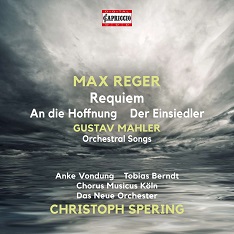Trügerische Hoffnungen sind das Leitmotiv dieses Albums, ein kohärentes Programm, das die Stimmung, das Endzeitgefühl in der Zeit des Ersten Weltkrieges hervorragend wiedergibt. Musikalisch wird es aus zwei Perspektiven betrachtet – jener von Max Reger und von Gustav Mahler: verschiedene Ausdrucksweisen für die große Sehnsucht nach Hoffnung, die dennoch meist entgleitet.
Christoph Spering und sein Ensemble fangen diese Atmosphäre sehr schön ein: die Musik hat immer etwas Schattenhaftes, es sind grundsätzlich Nachtmusiken mit kurzen Lichtblicken, die wir erleben. Die Phrasierung, die sehr fein den jeweiligen Texten folgt, der geschmeidige, warme Klang, das Schwermütige unterstreichen diese Stimmung, in der sich immer wieder große seelische Stürme entfachen. Die Dramaturgie stimmt.
Anke Vondung (Mezzosopran) und Tobias Berndt (Bariton) gestalten ihre Texte mit feinem Gespür für die Einheit von Dichtkunst und musikalischer Umsetzung, was wir grundsätzlich auch vom guten Chorus Musicus Köln sagen könnten, wäre da nicht die Schieflage in der Balance, die das Sängerensemble eher zu einem Klangelement des Orchesters macht als zu einem eigenständigen Akteur, der eine gleichermaßen wichtige Rolle zu spielen hat. Zum Glück gibt es im Booklet die Texte als sicherer Begleiter.
Deceptive hopes are the leitmotif of this album, a coherent program that excellently reflects the mood, the end-time feeling in the time of the First World War. Musically, it is approached from two perspectives – that of Max Reger and of Gustav Mahler: different ways of expressing the great longing for hope, which nevertheless mostly slips away.
Christoph Spering and his ensemble capture this atmosphere beautifully: the music always has something shadowy about it; it is basically night music with brief glimpses of light that we experience. The phrasing, which very finely follows the respective texts, the smooth, warm sound, the melancholy underline this mood, in which great emotional storms ignite again and again. The dramaturgy is right.
Anke Vondung (mezzo-soprano) and Tobias Berndt (baritone) shape their texts with a fine sense of the unity of poetry and musical realization, which in principle we could also say of the good Chorus Musicus Köln, were it not for the imbalance in the balance, which makes the ensemble of singers more a sound element of the orchestra than an independent actor with an equally important role to play. Fortunately, the booklet provides the texts as a safe companion.


















